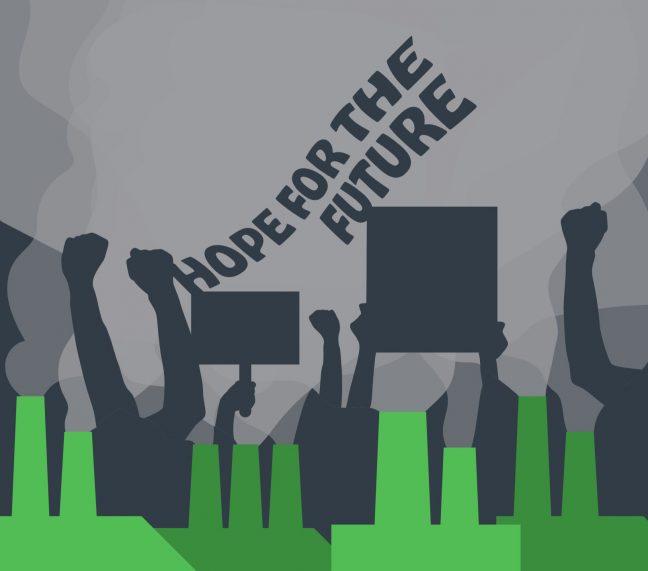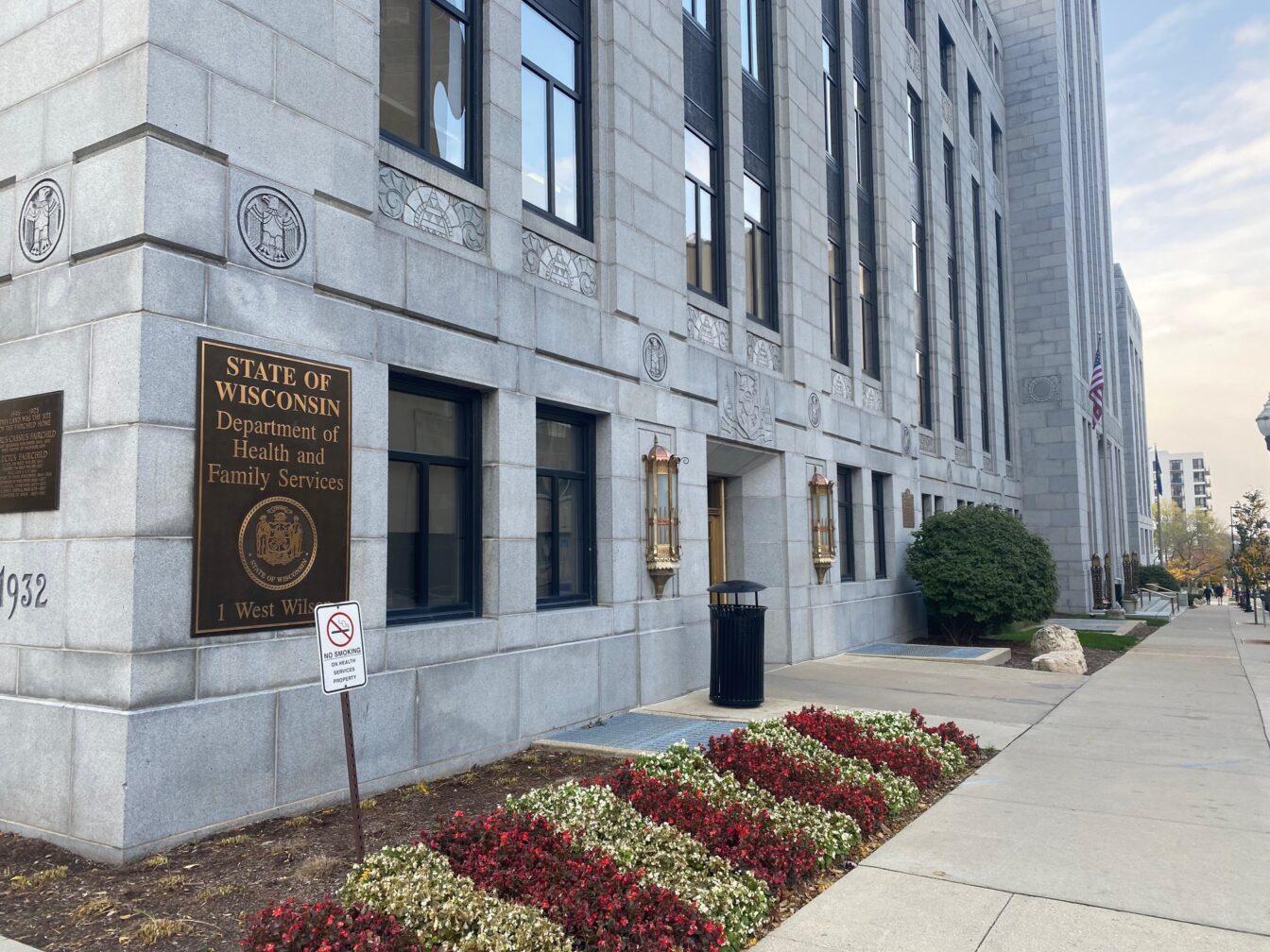Climate change caused 262 deaths in the past year in the U.S. alone.
A recent United Nations report reflects an even grimmer future — before a child born today turns 30, the impacts of climate change — such as species extinction, widespread disease, unlivable heat, ecosystem collapse and rising seas — will be staggeringly obvious. Scientists warn the number of people facing chronic hunger, extreme poverty and death will only grow as the climate warms.
As the planet’s temperature rises, students’ tolerance for stagnant climate policies declines. In the face of what some scientists call a climate emergency, University of Wisconsin student groups are taking action to combat climate change, demanding UW’s complete divestment from fossil fuels.
Digging into Divestment
The UW Foundation and Alumni Association, known as WFAA, is one of the UW System’s independent, private 501(c)(3) non-profit organizations. It’s governed by a board comprising UW alumni and donors.
The WFAA’s most recent asset class information is in its 2019-2020 Financial Report, but its last public estimate of its investments in fossil fuels is from 2017-2018. The report estimates WFAA’s investments in oil and gas accounted for over $124 million of its approximately $3.8 billion in total investments as of June 2018. But WFAA CEO and President Michael Knetter said fossil fuel assets have been a diminishing percentage of overall portfolio investments.

The 2018 estimate is based on oil and gas companies’ net asset values, or NAV, which is a company’s assets minus its debts. Because private equity, hedge funds, timber, real estate, oil and gas don’t have quoted market prices, they’re carried at NAV per share or its equivalent. Oil and gas investments are paired together in the report under alternative investments, but quoted market prices are not available.
This means the most recent price that buyers and sellers of oil and gas agreed upon is not available to the public. The data presented regarding fossil fuel investments is an estimate of what the foundation invested in those years. While specific information about tangible figures is not available, the estimates confirm the foundation is actively invested in oil and gas.
Several groups have questioned the foundation’s investment in fossil fuels as the means to procure funds to donate to UW. For example, the Wisconsin Initiative on Climate Change Impacts — a statewide collaboration of scientists and stakeholders that UW created in partnership with the Department of Natural Resources — released a report calling on all UW System Foundations to sell their stocks and investments in the top 200 fossil fuel companies and ban any future fossil fuel investments.
The organization submitted the directive a year after Gov. Tony Evers asked the group to guide his Task Force on Climate Change, which resulted in a report detailing the extent to which Wisconsinites already experience climate change’s consequences.
On the grassroots level, the Wisconsin Student Climate Action Coalition is one of the many student-led groups pioneering the cause for responsible environmental efforts on campus. Also known as WSCAC, the coalition organizes with representatives from environmental and social justice groups to build a movement of UW students advocating for climate action, environmental justice and sustainability.
WSCAC Co-chair Stephanie Janeth Salgado Altamirano said the coalition works as a medium to allow direct action organization across UW’s many climate justice organizations. Altamirano stressed the importance of building a coalition outside of the university to advocate for change on campus.
“There’s a lot of guidelines student [organizations] have to follow if you’re going to receive funding from the university that would stop a lot of our direct actions,” she said.
One group WSCAC works with is UW Divestment Coalition, a student-led organization representing all 13 UW campuses. UW Divestment’s team coordinator Molly McGuire said the coalition has three main goals.
“The first is to have all UW System Foundations provide transparency about what they invest in, the second is to have them divest from any fossil fuel-related companies and our third is to have them reinvest in companies that will actually benefit the state of Wisconsin and promote a clean, equitable future,” McGuire said.
Two steps forward, three steps back: Some fear for the future of the right to choose
McGuire said about 5% of a typical portfolio contains fossil fuel investments. Between all the foundations, UW Divestment estimated there are $7 billion of investments. The coalition evaluates the UW System Foundations invest $315 million every year in fossil fuels.
It’s McGuire’s belief the Board of Regents should create legislation to send a clear message to the foundation — if WFAA does not stop investing in fossil fuels, the UW System will not accept its money and end their relationship. McGuire said she believes the UW System is culpable to a degree because they have the power to influence the foundation given their strong relationship, but do not.
The Associated Students of Madison, the Climate Defense Project and student governments from UW-Stevens Point, UW-Eau Claire, UW-La Crosse, UW-Oshkosh, UW-Parkside, UW-Stout and UW-River Falls have all called on the WFAA to remove its investments in fossil fuels. In 2020, all Big Ten student body presidents unanimously passed a resolution demanding their universities freeze fossil fuel investments.
Student initiatives like WSCAC and UW Divestment serve as direct action groups, continuing to challenge the status quo of current sustainability efforts on campus. But students are not alone in their calls for divestment from the ground level on campus.
Faculty Senate Support
UW’s faculty is governed by the Faculty Senate which can vote to change rules and pass resolutions outlining the faculty’s stance on divestment. Former Faculty Senate member Steph Tai, who currently works as a UW professor of law and as legal representation for prominent climate scientists and numerous professional aquatic science societies, co-drafted one such resolution for divestment and sustainable procurement.
“This is different from other divestment resolutions happening around the country,” Tai said. “[The resolution] calls not only for carbon-friendly investments that divest from fossil fuels, but also carbon-friendly procurement in terms of what we buy for the university — including things like food, paper and furniture.”
Tai said the secretary of the faculty is forming a working group to assist with the more practical efforts of moving forward with divestment, likely studying the acquisition processes and how to negotiate with the WFAA.
The working group is studying environmentally friendly procurement, Tai said. The resolution they co-drafted will give the group more force within the university to initiate change.
Though this is a good first step, the process is taking longer than Tai would like.
“There still needs to be work done by the University of Wisconsin Alumni Foundation. They unfortunately have been reluctant to proceed on this front,” Tai said. “Not only is this important for the future of the planet but also important in terms of not having risky investments, there’s more and more fossil fuel companies getting sued or hit with fines, so it’s actually not a very good investment from a non-environmental standpoint.”
While there’s near-unanimous faculty support for the resolution, this consensus is nothing new — a divestment resolution was first proposed in the 2010s but didn’t include the new details on the process of business spending.
Though UW Chancellor Rebecca Blank hasn’t vocalized a stance regarding divestment and more environmentally sound procurement, Tai said her support would serve the cause. Given the UW foundation’s status as alumni-run and owned, however, Tai stated the most powerful catalyst for the foundation to change would be if alumni spoke up.
“The risk of investing in fossil fuels is getting higher, and I think that’s what is going to change their position, not necessarily responding to climate change,” Tai said.
Tai added the working group will document risks for the foundation in a persuasive way.
Doubts About Divestment
The Office of Sustainability currently uses the Sustainability Tracking, Assessment & Rating System, or STARS, to track UW’s sustainability progress. Though UW ranks the lowest out of Big Ten universities, some of those schools’ reports — like the University of Minnesota — are expired. UW’s most recent sustainable procurement score is two out of three.
Assistant director of the Office of Sustainability Nathan Jandl explained that in the most basic sense, procurement is how UW obtains its goods. The procurement score evaluates the pathways through which UW sources its supplies such as food, furniture and paper as well as what kind of carbon footprint these goods have, which includes their lifecycles. Jandl said the Office of Sustainability is currently working with procurement professionals on campus about how to improve these factors.
UW’s sustainability efforts within the context of the products and services it procures are better than its efforts regarding sustainable investments, Jandl said. UW’s sustainable investment score is zero out of four since UW did not self-report data. The only response UW gave was “no” to a question that asked if the institution wished to pursue positive sustainability investment.
“I don’t think it’s uncommon for institutions not to self-report on their investment strategies,” Jandl said. “The body that’s doing the investing in this case is the UW Foundation which is a private entity that is affiliated with UW but not a part of it. There’s not a direct responsibility for them to report their investments to the university.”
WFAA CEO and President Michael Knetter said the foundation hires outside managers to invest funds on its behalf and it takes environmental, social and governance — also called ESG — factors into consideration when it selects them.
Knetter said when looking through to the holdings of outside managers, the foundation’s share of investments in fossil fuel-related entities is very small. Knetter also stated the foundation’s fossil fuel assets have been a diminishing percentage of their overall investments.
United in action: UW students rally to reimagine public safety on Wisconsin campuses
The WFAA board of directors discussed the possibility of introducing a new investment option in which donors could choose to place their money in a strategy with a heavier emphasis on ESG factors but chose not to pursue it because of the potential expenses.
Jandl said the Office of Sustainability doesn’t have a specific stance regarding the WFAA’s investments but is supportive of looking into financial leverage for achieving climate action.
In Jandl’s view, divestment is more of a symbolic gesture than it is a practical one for reducing greenhouse gas emissions.
“The more I’ve learned about divestment, the more I understand it’s an important thing from the perspective of sending a message and sometimes an important thing from the perspective of emissions reductions, but mostly the former as opposed to the latter,” Jandl said.
Knetter explained the foundation has a fiduciary responsibility to its board of over 40 alumni donors to pursue the best return on investment as prudent stewards of their gift. Eliminating any category of investment could be a legal and ethical violation of their fiduciary duties.
Though Knetter said the foundation listens to student and staff calls for divestment, considers these perspectives and has ongoing discussions about the issue with its Board of Directors.
A declaration of divestment would be welcomed by some donors, but for many it would feel like their money is being used as a political statement, Knetter said. On the other hand, student activists have argued not divesting from fossil fuels is a political statement as well.
But UW hasn’t shied away from politicization in the past — UW was one of the first universities to recognize the apartheid in South Africa and at the forefront of divesting by selling all its holdings in companies doing business in the country a decade before most other divestment campaigns. Now, a South African non-profit is asking UW to stop investing in fossil fuels completely.
“Donors do not, and should not dictate institutional investment policy, especially given that the University of Wisconsin is a public institution — their main goal is to support the mission of the university or college,” Fossil Free South Africa said on its website. “Since fossil-free investment fits the institution’s mission, it should pose no problem for them.”
Details of Divestment
Similarly to the point Jandl made about the tangible impact of divestment to actually reduce emissions, recent research from Ivy League experts shows divestment from companies that do not meet the ESG criteria may not be as practical as some believe. In order to have a real impact, major investors would need to divest in overwhelmingly large numbers.
But investment giants are beginning to do just that. Last month, ABP — one of the world’s largest pension funds with assets worth over $400 billion — said it will purge its entire holding of $17.5 billion in the fossil fuel industry and invest instead in clean energy in the car and aviation industry. Ford Foundation, one of the largest U.S. private foundations which was built on the back of the fossil fuel industry, also announced its plans to divest and invest in renewable energy. Coutts, Queen Elizabeth II and the British royal family’s wealth manager, has also promised to divest.
Even BlackRock, the biggest asset manager on earth, which has historically refused to take action on climate change, asked its analysts to assess portfolios of those who have divested. They found investors who disinvested from fossil fuels saw both moral and financial gain — reporting no negative performance as a result of divestment but instead “outperformed their benchmarks” and found neutral to positive results.
The Wisconsin Legislative Reference Bureau found there is no clear process through which the state can require the UW System Foundation to divest from fossil fuels because the foundation is a private 501(c)(3) nonprofit corporation, but the Governor’s Task Force on Climate Change Report explicitly states the UW System Foundations should discontinue investments in the top 200 fossil fuel companies.
Though the path seems unclear, several other high-profile universities have taken steps toward divestment in recent years. The world’s leading higher education institutions, such as Harvard, Dartmouth, Cambridge, Oxford, Columbia, Brown and Cornell University have entirely divested from fossil fuels. Even Big Ten universities, including Minnesota, Michigan-Ann Arbor, Illinois at Urbana-Champaign and Rutgers announced their plans to divest — adding to the growing number of almost 1,500 institutions worldwide that have divested $39.88 trillion total.
Regardless of UW, more young students who feel the threats of climate change will come into UW every year, meaning student vigor and power are only set to grow, student leaders contend.
Leaders like McGuire and Altamirano will continue to stand up and fight for divestment and a sustainable future — whether alumni investing in fossil fuels change their minds or not.
“UW policies are not sustainable and do not live up to the morals and values that we now, as a society and as young people, value considering this climate crisis,” Altamirano said.














